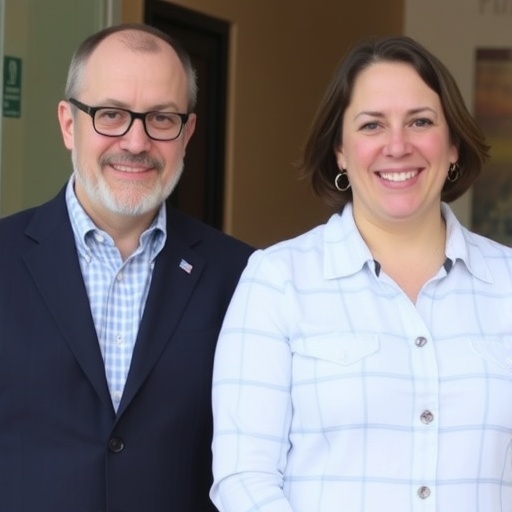In a groundbreaking collaboration between psychology and medicine, researchers have secured a prestigious BSF-NSF grant to explore the profound impact of brief, playful social interactions on brain function and cognitive performance in the aging population. This novel study is spearheaded by Professor Boaz Ben-David from the Baruch Ivcher School of Psychology alongside Dr. Yulia Golland of the Dina Recanati School of Medicine. Their interdisciplinary approach, combining state-of-the-art neuroimaging and physiological monitoring, promises to fundamentally enhance our understanding of how playfulness influences brain plasticity and cognitive resilience in older adults.
Employing advanced functional magnetic resonance imaging (fMRI) at high magnetic field strengths — including 3 Tesla and 7 Tesla scanners — the research team is poised to capture the intricate dynamics of the brain’s salience network. This network plays a critical role in detecting and prioritizing behaviorally relevant stimuli, acting as a gateway for cognitive processing. Age-related degradation of the salience network’s connectivity frequently underlies declines in attention and executive control, but the researchers hypothesize that engagement in playful social contexts may reinvigorate this system’s efficiency.
Beyond the salience network, the investigators are delving into how playful engagement modulates connectivity with other key neural circuits responsible for attention, language processing, and motor functions. These inter-network communications typically weaken with advancing age, contributing to cognitive deficits and reduced functional capacity. By characterizing the neurofunctional patterns elicited by spontaneous play, the team seeks to elucidate mechanisms of cognitive protection and potential reversal of aging-related neural decline.
Complementing brain imaging, the study incorporates detailed physiological assessments that track autonomic and affective markers associated with arousal states. Parameters such as pupil dilation, skin conductance responses, and heart rate variability are continuously monitored to paint a comprehensive picture of the body’s intrinsic response to positive social stimulation. Moreover, subtle indicators of mood, inferred through facial electromyography assessing muscle activity, provide insight into the emotional substrates that support enhanced cognitive function.
A particularly innovative facet of this research is its emphasis on subcortical brainstem structures implicated in neurochemical modulation. The locus coeruleus, a primary source of brain norepinephrine, and the substantia nigra, a critical dopaminergic center, are examined for their involvement in mediating the cognitive benefits of play. These regions are known to orchestrate attention, motivation, and learning, and their functional integrity is increasingly recognized as pivotal in safeguarding against dementia-related neurodegeneration.
The relationship between neurotransmitter release within these brainstem nuclei and the modulation of large-scale brain networks remains a frontier in aging neuroscience. By integrating fMRI data with physiological markers and behavioral measures, the study aims to establish causal pathways linking playful social interactions to improved neural efficiency and cognitive outcomes. This approach represents a sophisticated model for understanding how positive emotional arousal can invigorate the aging brain.
In terms of cognitive assessment, the research deploys a battery of standardized tests targeting attention span, memory retention, and verbal fluency. These domains are critical indicators of cognitive flexibility—the ability to adaptively shift between tasks and integrate new information—whose preservation is integral to maintaining independence in older adults. Demonstrating that brief episodes of social play can tangibly boost performance in these domains would mark a significant advance in geriatric cognitive health interventions.
Should the study’s hypotheses prove valid, the implications are both scientific and societal. Insights gained from neural and physiological correlates of play-induced cognitive boosting could inform the design of accessible, cost-effective intervention programs targeting older adults at risk of cognitive decline. These programs could be seamlessly integrated into clinical practices or community centers, fostering better cognitive aging trajectories at a population level.
This research epitomizes the ethos of translational science, melding rigorous fundamental neuroscience with pragmatic solutions that address pressing public health challenges. Turning mechanistic understanding of brain function and neurochemical dynamics into concrete strategies aligns with the global imperative to extend healthspan alongside lifespan, mitigating the burden of dementia and related morbidities.
The collaborative network underpinning this endeavor extends internationally, involving distinguished scientists including Professor Mara Mather of the University of Southern California and Professor Shoshi Keisari from the University of Haifa. This broad partnership underscores the universal relevance and strategic importance of uncovering the biological substrates linking social behavior, affective neuroscience, and cognitive aging.
Through this multifaceted investigation, Professor Ben-David and Dr. Golland are charting new territory in the neuroscience of aging, positioning playfulness not merely as a leisure activity but as a potent driver of neural integrity and cognitive vitality. Their work stands to redefine how societies approach cognitive health maintenance, emphasizing the transformative power of positive social engagement even in later life.
As the study progresses, anticipation builds within the scientific community regarding its potential to shift paradigms in aging research and intervention. The blend of sophisticated imaging, physiological monitoring, and behavioral science promises a richly textured understanding of how simple, playful moments can profoundly reshape older adults’ cognitive landscapes.
In conclusion, this pioneering research offers compelling evidence that playful social interactions engage complex brain networks and neurochemical pathways essential for cognitive preservation. By harnessing these natural, enjoyable behaviors, it may be possible to develop innovative, scalable interventions that enhance cognitive function, thereby improving quality of life for millions of older individuals worldwide.
Subject of Research: The effects of brief, playful social interactions on brain function and cognitive performance in older adults, focusing on the salience network and brainstem neurochemical activity.
Article Title: Playfulness and the Aging Brain: Unveiling Neurochemical and Network Dynamics That Enhance Cognitive Flexibility
News Publication Date: Not provided
Keywords: Adults, Cognitive Psychology, Cognitive Control, Cognitive Function, Central Nervous System




